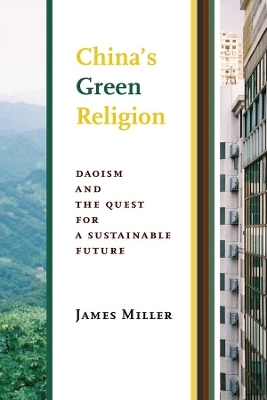
China's Green Religion
Daoism and the Quest for a Sustainable Future
Seiten
2017
Columbia University Press (Verlag)
978-0-231-17586-9 (ISBN)
Columbia University Press (Verlag)
978-0-231-17586-9 (ISBN)
In China’s Green Religion, James Miller shows how Daoism orients individuals toward a holistic understanding of religion and nature. Explicitly connecting human flourishing to the thriving of nature, Daoism fosters a “green” subjectivity and agency that transforms what it means to live a flourishing life on earth.
How can Daoism, China's indigenous religion, give us the aesthetic, ethical, political, and spiritual tools to address the root causes of our ecological crisis and construct a sustainable future? In China's Green Religion, James Miller shows how Daoism orients individuals toward a holistic understanding of religion and nature. Explicitly connecting human flourishing to the thriving of nature, Daoism fosters a "green" subjectivity and agency that transforms what it means to live a flourishing life on earth. Through a groundbreaking reconstruction of Daoist philosophy and religion, Miller argues for four key, green insights: a vision of nature as a subjective power that informs human life; an anthropological idea of the porous body based on a sense of qi flowing through landscapes and human beings; a tradition of knowing founded on the experience of transformative power in specific landscapes and topographies; and an aesthetic and moral sensibility based on an affective sensitivity to how the world pervades the body and the body pervades the world.
Environmentalists struggle to raise consciousness for their cause, Miller argues, because their activism relies on a quasi-Christian concept of "saving the earth." Instead, environmentalists should integrate nature and culture more seamlessly, cultivating through a contemporary intellectual vocabulary a compelling vision of how the earth materially and spiritually supports human flourishing.
How can Daoism, China's indigenous religion, give us the aesthetic, ethical, political, and spiritual tools to address the root causes of our ecological crisis and construct a sustainable future? In China's Green Religion, James Miller shows how Daoism orients individuals toward a holistic understanding of religion and nature. Explicitly connecting human flourishing to the thriving of nature, Daoism fosters a "green" subjectivity and agency that transforms what it means to live a flourishing life on earth. Through a groundbreaking reconstruction of Daoist philosophy and religion, Miller argues for four key, green insights: a vision of nature as a subjective power that informs human life; an anthropological idea of the porous body based on a sense of qi flowing through landscapes and human beings; a tradition of knowing founded on the experience of transformative power in specific landscapes and topographies; and an aesthetic and moral sensibility based on an affective sensitivity to how the world pervades the body and the body pervades the world.
Environmentalists struggle to raise consciousness for their cause, Miller argues, because their activism relies on a quasi-Christian concept of "saving the earth." Instead, environmentalists should integrate nature and culture more seamlessly, cultivating through a contemporary intellectual vocabulary a compelling vision of how the earth materially and spiritually supports human flourishing.
James Miller is professor of Chinese studies and director of the interdisciplinary graduate program in cultural studies at Queen's University in Canada. He is the author of The Way of Highest Clarity (2008) and Daoism: A Beginner's Guide (2008) and the editor of Chinese Religions in Contemporary Societies (2006), Religion and Ecological Sustainability in China (2014), and Daoism and Ecology (2001).
Acknowledgments Introduction 1. Religion, Modernity, and Ecology 2. The Subjectivity of Nature 3. Liquid Ecology 4. The Porosity of the Body 5. The Locative Imagination 6. The Political Ecology of the Daoist Body 7. From Modernity to Sustainability 8. From Sustainability to Flourishing Notes Bibliography Index
| Erscheinungsdatum | 14.06.2017 |
|---|---|
| Zusatzinfo | 10 b&w illustrations |
| Verlagsort | New York |
| Sprache | englisch |
| Maße | 152 x 229 mm |
| Themenwelt | Geisteswissenschaften ► Geschichte ► Regional- / Ländergeschichte |
| Geisteswissenschaften ► Philosophie ► Östliche Philosophie | |
| Geisteswissenschaften ► Religion / Theologie ► Weitere Religionen | |
| Naturwissenschaften ► Biologie ► Ökologie / Naturschutz | |
| Sozialwissenschaften ► Politik / Verwaltung ► Staat / Verwaltung | |
| ISBN-10 | 0-231-17586-8 / 0231175868 |
| ISBN-13 | 978-0-231-17586-9 / 9780231175869 |
| Zustand | Neuware |
| Informationen gemäß Produktsicherheitsverordnung (GPSR) | |
| Haben Sie eine Frage zum Produkt? |
Mehr entdecken
aus dem Bereich
aus dem Bereich
Erinnerungen
Buch | Softcover (2024)
Pantheon (Verlag)
CHF 22,40


